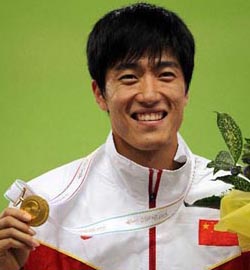During the first Summer Olympic Games to be held in China, the biggest sport they could compete in, the Chinese track-and-field athletes have no reason to drop behind.
Yet, compared with their peers in other sports of the Games, the Chinese track and field competitors are probably the last group of people that the world's most populous country would care during the Olympics.
The Athens Games has changed the Chinese audience's attitude towards the performance and ability of their track-and-field players, where they grabbed two gold medals and other six top-eight places, the best result in history.
|

Liu Xiang |
Liu Xiang's 110 meters hurdle gold has been not only a milestone for the Chinese men's track but also stimulation of the comprehensive sports strength for the whole country.
In the Los Angeles Games 76 years ago, the first Chinese Olympic athlete sprinter Liu Changchun competed in 100 and 200 meters races. However, his successors only gained three gold medals in women's race walk and 5,000 meters before 2004.
No one could predict how many medals the Chinese could reap this summer, but 110 meters hurdle and women's long-distance races, with marathon in particular, have been desperate hopes despite the conditions of the athletes and their rivals.
The 25-year-old Liu Xiang would probably become the most difficult defending champion at the upcoming Games in the Chinese track and field with totally different situation he faces from that of four years ago.
Liu, 1.89 meters high, had defeated legendary American hurdler Allen Johnson twice before he won the Athens gold. However, when he steps on the tracks at the National Stadium in August, Liu will never be a dark horse, instead, he is the defending champion.
It could not be worse when Chinese fans knew their hero suffered a pull injury in his legs, of which only Liu and his coach Sun Haiping knew the real conditions.
What's more, one of Liu's strongest rivals Dayron Robles of Cuba refreshed his world record by 0.01 second less than two months ahead of the Beijing Games.
Robles created a new world record and evened Liu's record of 12.88 seconds at a time so close to the Olympics, making Liu's coach praise Robles' excellent shape and admit the three years junior was a driving opponent.
The Chinese women's race walkers once enshrined China's first Olympic gold medal in the track and field in the country's sports glory when Chen Yueling won the 10 kilometers at the Barcelona Games. Chen's success was repeated by Wang Liping who won the 20 kilometers race walk at the Sydney Games.
Being expected to bring surprise to the country at the Beijing Games, race walker Song Hongjuan was announced to fail a doping test conducted by the International Association of Athletics Federations(IAAF) in March. She was thus suspended for four years for taking Erythropoietin (EPO), which stimulates the production of red blood cells.
Song became the national champion in 20 kilometers race walk in 2003 at 1 hour 27 minutes and 16 seconds. While the best result finished by the Chinese race walkers in 2008 was 1 hour 29 minutes and 8 seconds, ranking the 19th place in the world.
In women's 10,000 meters races, Chinese runners could hardly compete against Ethiopian corps if they could not finish within 31 minutes, although the event's world record created by Wang Junxia of China remains intact for nearly 15 years.
Men's 50 kilometers race walk and women's marathon may be new hopes for Chinese athletics at the Beijing Games. Si Tianfeng has won the champion of the only race walk test event at the National Stadium, known as Bird's Nest, with a mark ranking worldwide seventh this year.
Other three walkers also created considerably good marks in the event, including Yu Chaohong, the fourth place winner at the Athens Games.
Zhou Chunxiu has been a rising star in women's marathon since she created the year's best in 2007 in 2 hours 20 minutes and 38 seconds and Zhang Yingying inked this year's best mark so far though it was only 2 hours 22 minutes and 38 seconds.
(Xinhua News Agency July 22, 208)